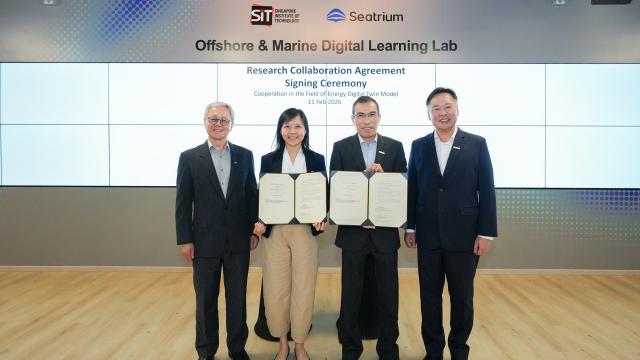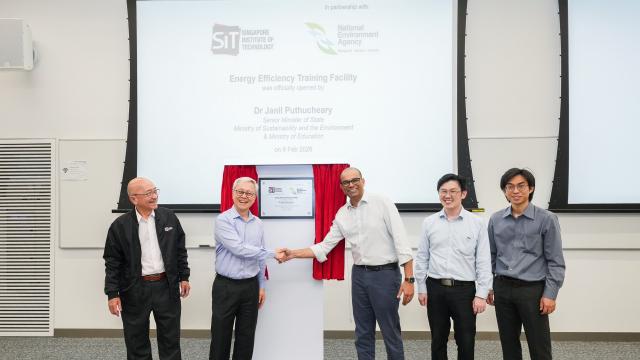
Grey skies, a lingering acrid smell and a soaring Pollutant Standard Index (PSI) level.
For the first time since August 2016, Singapore’s PSI level had gone beyond the 100 mark. The repercussions were immense. Air quality had reached unhealthy levels, resulting in poor visibility on the roads.
Despite being more than 10,000 km away in Regensburg, Germany, third-year Telematics (Intelligent Transportation Systems Engineering)* student Macalino Noel Minjoot knew he had to do something.
The 28-year-old was about to embark on his Integrated Work Study Programme (IWSP) at a multinational automotive parts manufacturing company.
A distinctive feature of Singapore Institute of Technology’s (SIT) degree programmes, the IWSP allows undergraduates to hone their skills in real-world industry settings.
He decided to tap on the knowledge he had gained in the classroom to create a practical, real-life solution. He devised an intelligent streetlamp system that would be able to detect pollutants in the air by using a particulate matter sensor.
This, he hoped, would help alert the authorities in advance and allow them to carry out haze prevention measures more effectively.
Within three months, he had gone from idea conception to prototype. His supervisors approved. “I knew right away that I was on the verge of something exciting,” he said.
“Being able to develop an idea that was able to address a major issue like the haze showed me the potential of telematics and its ability to change the world,”
A first-of-its-kind curriculum
 A first-of-its-kind degree in Singapore, the Telematics curriculum at SIT marries two interdisciplinary fields — vehicular telematics and Intelligent Transportation Systems (ITS) Engineering.
A first-of-its-kind degree in Singapore, the Telematics curriculum at SIT marries two interdisciplinary fields — vehicular telematics and Intelligent Transportation Systems (ITS) Engineering.
As someone who has always been drawn to the fields of both engineering and coding, choosing the Telematics (ITS Engineering) programme meant that Macalino could experience the best of both worlds.
As Macalino explains, beneath the complex theories and algorithms, telematics is essentially about making a difference in people’s lives.
He cites the example of how ITS technologies are helping land-scarce countries like Singapore optimise limited road space. Sensors and data analytics are used to maximise road network efficiency capacity and manage traffic flow by providing motorists with real-time information on traffic incidents, indicative traffic speeds and specific locations of roadworks.
As Singapore slowly warms up to the idea of electric and autonomous vehicles, the country’s transportation network will experience a greater integration of infrastructure and smart systems.
The mobility system of the future will be radically different from the existing frameworks of today. This is what excites Macalino the most.
“Living in a smart city like Singapore provides you with the best opportunity to experiment with new ideas so the sky is truly the limit when it comes to telematics.”
Friends in all the right places
Despite its relatively recent introduction, the specialised global telematics industry may be an option for those looking for a unique and refreshing career prospect.
In his capacity as a SITizen Ambassador, a reputable student leadership role at SIT, he actively seeks out companies with telematics vacancies and links them up with his classmates. In addition, he also makes it a point to introduce classmates to potential hirers in person whenever there is a career fair on campus.
“Plenty of companies are realising the potential of telematics so this means great news for anyone hoping to enter the industry,” he said.
Enter the dragon
He is so immersed in his professional pursuits that he brings it into his hobby as an avid practitioner of wushu, the Chinese martial arts.
An effective transportation system is similar to a well-curated wushu performance, shared the captain of the SIT wushu team. Both require ample planning and lots of trial and error before they can be successful.
Most importantly, both need to be adaptable to changing environments in order to stay relevant, he observed.
“Practicing wushu has taught me two important life lessons — planning in advance and preparing for the unknown,” he said.
“In a highly unpredictable global climate, these are the kind of lessons that will help me along my way.”
* Starting Academic Year 2021, the Telematics (Intelligent Transportation Systems Engineering) programme will be renamed to Bachelor of Engineering with Honours in Computer Engineering.















![[FA] SIT One SITizen Alumni Initiative_Web banner_1244px x 688px.jpg](/openhouse2025/centre-professional-communication/sit-teaching-and-learning-academy/sit-teaching-and-learning-academy/sites/default/files/2024-12/%5BFA%5D%20%20SIT%20One%20SITizen%20Alumni%20Initiative_Web%20banner_1244px%20x%20688px.jpg)


